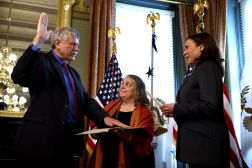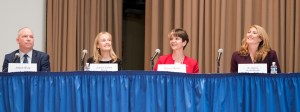FedScoop premiered its mini-documentary film, “Tenacity,” Thursday night at the Woolly Mammoth Theater in Washington, D.C. About 200 women (and a few men) from the federal IT community packed the theater to hear from generations of women who have succeeded in their careers and overcome a multitude of cultural obstacles that still stand in the way of full equality for women in the workplace.
As a co-producer of the film, along with my colleague Colby Hochmuth, I brought my 8-year-old daughter along to the screening. Although she’s always bringing home science books from the library and is already the ‘hacker-in-residence’ at our home, I though it was important that she learn early on that women haven’t always been treated fairly in our society and that a lot of the inequities that women have faced for decades in the workplace continue to this very day.
If I learned anything from making this documentary it was that our nation’s future science, technology, engineering and mathematics workforce is already being shaped by what we tell the girls who are my daughter’s age – our second and third graders. This is where we, as parents, educators and mentors, have a choice. We can either light a fire of curiosity and wonder, and a sense of empowerment that anything is possible, or we can sow the seeds of defeat by telling our young girls that there are some things that are just too hard for them to do.
Every person we interviewed for “Tenacity,” among the most accomplished women and men in government and the private sector, pointed to society’s messaging to girls during grade school as a critical factor in how far our girls will go in their STEM educations and possible careers.
Ellen McCarthy, the chief operating officer at the National Geospatial-Intelligence Agency, tells us a story of her daughter’s third grade math teacher. That teacher had told her daughter at the ripe old age of 10 that she “wasn’t good at math.” McCarthy then recounts what she did when she learned of this, but I won’t spoil your surprise here. You can watch her answer for yourself by watching “Tenacity.”
“I do think that what’s happening in the fourth grade is very important in terms of what’s going to happen when somebody’s 25,” said Rep. Zoe Lofgren, D-Calif., who added that a Congressional colleague confided to her that when she had expressed interest in engineering as a young girl she was told “girls don’t do math.”
Well, girls do math today. I know, because my wife and I helped our daughter with her math homework when we got home from the “Tenacity” premiere last night. And they not only do math, but they go on to become great engineers and CIOs at some of our biggest federal agencies and private enterprises.
What a shame it would be if we continue to allow our society to tell our young girls they have limitations before they’re even old enough to fully understand there’s a world beyond their school playgrounds. That’s not mentorship, its not leadership, and it’s not right. Worst of all, it’s a formula for America’s failure in STEM.






